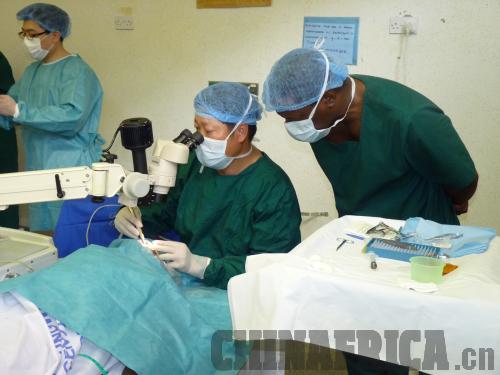|
 |
|
VISION QUEST: A Chinese ophthalmologist at work in Malawi |
On November 25, 2010, the joy was palpable at Chitungwiza General Hospital, a medical center 30 km away from Harare, Zimbabwe. Ophthalmology patients were having their eyes examined. An elderly lady diagnosed with cataracts, now post-surgery, was effusive, "The eye with the cataract now can see even more clearly than the other one! I'm deeply thankful to the Chinese doctors."
The doctors she's referring to ran an eight-day program called "Blindness Prevention Trip," during which 12 Chinese eye specialists operated on 612 cataract patients. They made the journey equipped with surgical equipment, artificial lenses and medicine, treating patients in Malawi and Zimbabwe. Dr. Zhu Siquan, known in Asia for his highly-efficient operation technique, said that he was truly touched by Zimbabwe people's friendliness. "I am devoted to returning sight to the patients," he said.
Both Zimbabwean President Robert Mugabe and Malawian President Bingu wa Mutharika have spoken highly of the Chinese doctors' deeds, calling them an inspiring force for their campaign against eye blindness.
According to World Health Organization (WHO) statistics, roughly 314 million people suffer from eye ailments. Of these, 45 million are completely blind and 20 million are cataracts patients. In 1999, the WHO announced its "Vision 2020: The Right to Sight," which ushered in the "Global Initiative for the Elimination of Avoidable Blindness." In 2003, China's National Blindness Prevention Group (NBPG) launched its "Brightness Action" program, dedicated to offering free eyesight-restoring surgery for 30,000 cataract patients in the country's remote and impoverished areas. Since 2008, the medical team has gone on to North Korea, Cambodia, Viet Nam, Mongolia and Bangladesh to treat local afflicted patients. At the end of 2010, the group arrived in Africa.
|